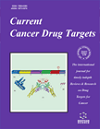-
s HR+, HER2 - Advanced Breast Cancer and CDK4/6 Inhibitors: Mode of Action, Clinical Activity, and Safety Profiles
- Source: Current Cancer Drug Targets, Volume 17, Issue 7, Sep 2017, p. 637 - 649
-
- 01 Sep 2017
Abstract
Background: Cyclin-dependent kinase (CDK) 4/6 inhibitor-based therapies have shown great promise in improving clinical outcomes for patients with hormone receptor-positive (HR+), human epidermal growth factor receptor 2-negative (HER2-) advanced breast cancer. Objectives: 1. Discuss the mode of action of the three CDK4/6 inhibitors in late clinical development: palbociclib (PD-0332991; Pfizer), ribociclib (LEE011; Novartis), and abemaciclib (LY2835219; Lilly). 2. Describe the efficacy and safety data relating to their use in HR+, HER2-advanced breast cancer. 3. Discuss the key side effects associated with CDK4/6 inhibitors along with considerations for adverse event management and patient monitoring. Method: Relevant information and data were assimilated from manuscripts, congress publications, and online sources. Results: CDK4/6 inhibitors have demonstrated improved progression-free survival in combination with endocrine therapy compared with endocrine therapy alone. The side-effect profile of each agent is described, along with implications for patient monitoring, and considerations for patient care providers and pharmacists. Conclusion: Addition of a CDK4/6 inhibitor to endocrine therapy increases efficacy and delays disease progression. Insight into the unique side-effect profiles of this class of agents and effective patient monitoring will facilitate the successful use of CDK4/6 inhibitor-based therapies in the clinic.


